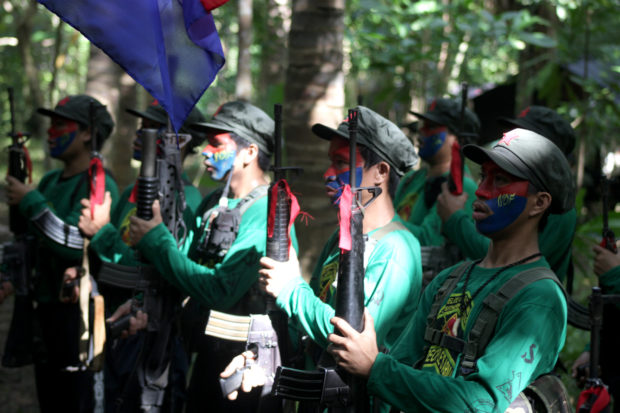Threats smack of Marcosian mind-set, says Bayan

REBEL THREAT Members of the communist New People’s Army (NPA) train in their Sierra Madre stronghold. President Duterte has said he would classify the NPA as a terrorist group. —INQUIRER PHOTO
The militant Bagong Alyansang Makabayan (Bayan) denounced as a “Marcosian mind-set” President Duterte’s threats against it and the communist New People’s Army (NPA).
In a statement issued on Sunday, Bayan secretary general Renato Reyes Jr. said Mr. Duterte’s “imagined conspiracy” between the two groups might be used as a pretext for his declaration of a revolutionary government in which “power is concentrated on the President.”
Allowing that to happen would be “1972 all over again,” he said, referring to the year when then President Ferdinand Marcos declared martial law, which left thousands of human rights victims. “The people, however, will resist such [a] plan. Never again.”
“Mr. Duterte’s threat of a crackdown is intended to eliminate the most effective resistance to fascist dictatorship, human rights abuses, antipeople economic impositions and increased US intervention,” Reyes said.
At a press conference in Davao City on Saturday, Mr. Duterte announced that he would classify the NPA as a terrorist group.
Article continues after this advertisementThe NPA is the armed wing of the Communist Party of the Philippines (CPP), which has been waging a guerrilla war for almost 50 years.
Article continues after this advertisementThe President also said he was ready to order a fresh offensive against the NPA as soon as state security forces had rested well, referring to the soldiers and policemen who took part in the five-month battle with Islamic State-inspired terrorists in Marawi City.
Peace talks
Reyes said peace talks with the NPA would deal with all the issues of Mr. Duterte with the group.
Threatening the NPA with a terrorist label, however, “will not accomplish anything, but only intensify attacks on the people,” the Bayan leader said.
Peace talks between the Duterte administration and the National Democratic Front of the Philippines (NDFP), the political arm of the CPP, have stalled.
Security analyst Chester Cabalza said Mr. Duterte’s decision to declare the NPA a terrorist group would not bode well for critics of the administration.
Cabalza took note of how the President “originally wanted an experimental government where all stakeholders operate within [the] government.”
Mr. Duterte appointed three Cabinet members nominated by the NDFP at the start of his administration. As the talks with the NDFP floundered, the Commission on Appointments rejected the appointments of Rafael Mariano to the Department of Agrarian Reform and Judy Taguiwalo to the Department of Social Welfare and Development.
“But it did not work and the experiment failed in favor of [the] government,” Cabalza said. “Those going against [the] government are terrorists. That’s the problem here.”
He said the ultimate intention was to consolidate power.
NPA attacks
At the press conference in Davao, Mr. Duterte said he would issue a proclamation that would take out the communist rebels from “the category of a legal entity.”
The CPP and the NPA have not been considered outlawed organizations since the repeal in 1992 of Republic Act No. 1700, or the Anti-Subversion Act of 1957. What could be applicable against the CPP-NPA is the crime of rebellion under the Revised Penal Code.
In 2002, the US Department of State labeled the CPP-NPA a terrorist organization. The European Union followed suit.
The terror tag on the CPP-NPA was lifted by a European court ruling in 2009 and allowed the unfreezing of the assets of exiled Filipino communist leader Jose Maria Sison.
The United States, however, kept the CPP-NPA on its terrorist list.
The Armed Forces of the Philippines “totally agrees” with Mr. Duterte’s decision to formally categorize the NPA as a terrorist group because of the crimes it allegedly continues to commit against “defenseless and innocent civilians,” the AFP spokesperson, Maj. Gen. Restituto Padilla, said in a text message on Sunday.
A top military official in Southern Tagalog, however, played down the capability of the NPA to wage retaliatory attacks against government forces.
“Initially, maybe if they can. But their forces are now weak,” Maj. Gen. Rhoderick Parayno, commander of the Philippine Army’s 2nd Infantry Division based in Tanay town in Rizal province, said in an online interview. —Reports from Dexter Cabalza, Nikko Dizon, Delfin T. Mallari Jr. and Inquirer Research